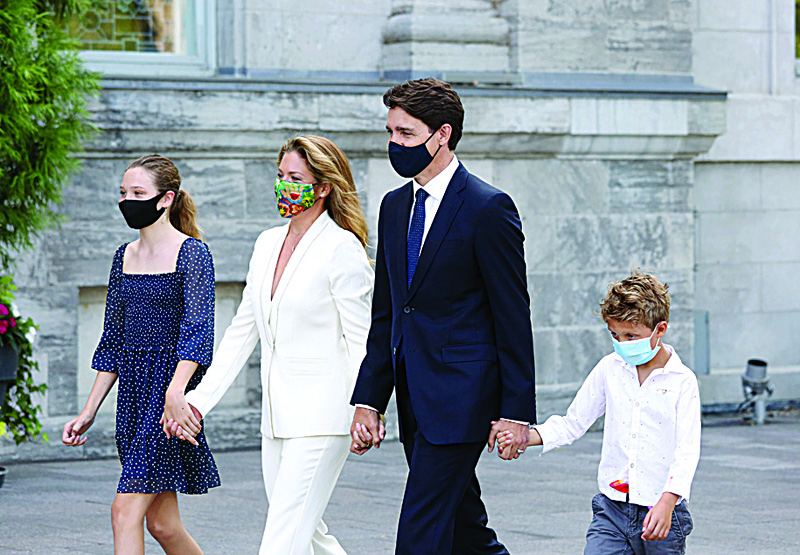 OTTAWA: Canada's Prime Minister Justin Trudeau (center), his wife Sophie Gregoire Trudeau (second left) and children Ella-Grace (left), and Hadrien arrive at Rideau Hall to ask Governor General Mary Simon to dissolve Parliament yesterday in Ottawa. - AFP
OTTAWA: Canada's Prime Minister Justin Trudeau (center), his wife Sophie Gregoire Trudeau (second left) and children Ella-Grace (left), and Hadrien arrive at Rideau Hall to ask Governor General Mary Simon to dissolve Parliament yesterday in Ottawa. - AFPOTTAWA: Canadian Prime Minister Justin Trudeau was expected to call snap elections for September 20 to seek a new mandate to steer the nation's pandemic exit, much to the dismay of his rival parties. Trudeau and opposition leaders have been crisscrossing the country in recent weeks, making election-style announcements in anticipation of an early vote. The prime minister was due to visit Governor General Mary Simon at 10 am local time (1400 GMT) to ask her to dissolve parliament, triggering a general election that polling shows is likely to return his Liberals to power.
Despite rolling out massive pandemic aid, passing a federal budget and other key legislation with opposition backing over the past year, Trudeau-in office since 2015 -- has lamented that parliament has become dysfunctional, with a "level of obstructionism and toxicity in the House that is of real concern." Opposition leaders disagreed, while warning that it's too soon to be charting a path out of the pandemic. They note that COVID-19 infections are once again surging nationwide, following a summer drop that resulted in most public health restrictions being lifted.
All five parties currently holding seats in Parliament are gearing up for a fierce battle at the ballot box. "Justin Trudeau's planning an election in the middle of a pandemic because he's focused on politics," tweeted Trudeau's main challenger, Conservative leader Erin O'Toole. "It's time we had a prime minister planning an economic recovery focused on Canadians," he added. "We're ready." Most Canadians approve of Trudeau's pandemic response. But if a fourth wave of COVID-19 infections strikes during the campaign, it could hurt his backing.
"This was the only window of opportunity for him because with students' return to school and universities in two weeks, Covid cases will inevitably go up," Felix Mathieu, political science professor at the University of Winnipeg, said. Trudeau's government "has already held for 18 months, which is the average lifespan for a minority government," he added.
Despite rising vaccination rates that are among the highest in the world-with almost 62 percent of Canadians fully inoculated-nearly 1,000 new daily COVID-19 cases have been reported across Canada recently. A spike in hospitalizations led Alberta-the first Canadian province to fully lift pandemic restrictions last month-to reintroduce coronavirus testing and mandatory quarantines for infected persons on Friday.
In striking distance
Trudeau was re-elected to office in 2019 but lost his majority in his second term, amid scandals. To regain a majority on September 20, the Liberals must win at least 170 of the 338 seats in the House of Commons, up 15 seats from its current standing. According to a recent Abacus Data poll, the Liberals are in striking distance of a majority, with 37 percent of support. The Conservatives and the leftist New Democrat Party-which propped up the Liberals until now and has seen an uptick in support-trail on 28 percent and 20 percent, respectively.
According to analysts, the Liberals have a good shot at winning a majority, while "the chances that the Conservatives will come out in front, even securing a minority government, are slim," said politics professor Stephanie Chouinard at the Royal Military College in Kingston, Ontario.
O'Toole, meanwhile, has struggled to find his footing since becoming leader of the Conservatives in August 2020, as lockdowns and other public health measures put glad-handing out of reach. In March, he found himself painfully at odds with his rank-and-file after telling a party convention that a robust plan to tackle climate change was needed if the Conservatives ever hoped to unseat Trudeau.
Members instead voted down a resolution that said "climate change is real." Campaigning is to last only 36 days, and is largely expected to revolve around pandemic management, the government's broad emergency aid programs, and a three-year CAN$101.4 billion (US$80.9 billion) post-pandemic stimulus plan. -AFP









